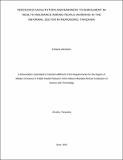| dc.contributor.author | Abraham, Elisante | |
| dc.date.accessioned | 2022-08-29T10:58:06Z | |
| dc.date.available | 2022-08-29T10:58:06Z | |
| dc.date.issued | 2022-06 | |
| dc.identifier.uri | https://doi.org/10.58694/20.500.12479/1515 | |
| dc.description | A Dissertation Submitted in Partial Fulfilment of the Requirements for the Degree of Master of Science in Public Health Research of the Nelson Mandela African Institution of Science and Technology | en_US |
| dc.description.abstract | Health financing is an important pathway towards universal health coverage (UHC). In Tanzania,
despite an improved Community Health Fund (iCHF) rollout, people in the informal sector haven’t
been fully enrolled. This study explored the perspectives of local-women food vendors (LWFV)
and Bodaboda (motorcycle taxi) drivers on factors that facilitate and challenge their enrolment in
iCHF. A phenomenological study was conducted in Morogoro Municipality. Fifty in-depth
interviews and two focus group discussions were conducted. Participants were purposively
selected based on being LWFV or Bodaboda drivers. The Theory of Planned Behaviour (TPB)
provided a framework for the inquiry and categorization of findings. Views from LWFV and
Bodaboda drivers regarding enrolment in iCHF converged. Enrolment facilitators on attitude:
value for money; and increased access to affordable health care. Subjective norms: encouragement
from already-enrolled friends and relatives. Perceived control: belief that enrolment premiums are
affordable; and improved health care. Barriers on attitude: limited knowledge of how the iCHF
works; and no health promotion activities. Subjective norms: negative views from friends and
family. Perceived control: the iCHF is not accepted in non-government facilities; limited time to
go for enrolment; and uncertainty about coverage of non-communicable diseases. Results suggest
that a positive attitude towards iCHF, supported by perceived benefits and encouragement from
significant others, can motivate LWFV and Bodaboda drivers to enroll. However, more
awareness of iCHF is needed among individuals in the informal sector. There is also a need to
make quality health care services available to iCHF members, including extending their
coverage. | en_US |
| dc.language.iso | en | en_US |
| dc.publisher | NM-AIST | en_US |
| dc.subject | Research Subject Categories::NATURAL SCIENCES | en_US |
| dc.title | Perceived facilitators and barriers to enrolment in health insurance among people working in the informal sector in Morogoro, Tanzania | en_US |
| dc.type | Thesis | en_US |

